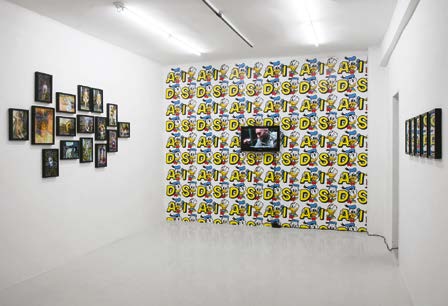Josef Rabara a Karol Radziszewski
Taboo Transformed into History
4. 9. 2015 — 26. 9. 2015
Tomorrow Will Be Different, a two-person exhibition featuring the photography of Josef Rabara and Karol Radziszewski, took place at the Fotograf Gallery in September. Both artists looked back at the stories of two men, who, although they were born fifty years apart, were linked by their homosexual orientation. The exhibition demonstrates the significance the photography medium has, not just in the queer community, but also beyond it. Sexual identity, just like photography, plays an important role in the art created by Rabara and Radziszewski.
In his installation, Tomorrow Will Be Different, Rabara brings to life the diary of Stanislav Z., a patient at the Prague Institute of Sexology in the first half of the last century. The artist’s installation completes the image of the suffocating atmosphere, words of uncertainty, and confusion about one’s own sexuality. A red mist covers the gallery’s walls, which are lined with photographic excerpts portraying young men engaged in sport, and intensifies the power of the portrayed taboo.
Radziszewsky’s video Kisieland, a cooperative effort with Ryszard Kisiel, a photographer and the founder of Filo, the first Polish gay magazine, brings back to life the spirit of the Polish queer community of the 1980s. The eccentric and bold photos of the gay community taken from Kiesel’s archives provide a sharp contrast to the shy and voyeuristic excerpts and collages in Rabar’s installation. However, in both cases, photography is a means of creating a rare artefact, a fetish, a memory. It is able to capture a second, disappearing at the moment of danger, and then reappearing as a memory. The meaning and symbolism of each individual photograph changes over time. That which is forbidden within the context of one era does not create a stir in the next. Taboo is transformed into history and all that was yesterday is different today.
#27 cars
Archive
- #45 hypertension
- #44 empathy
- #43 collecting
- #42 food
- #41 postdigital photography
- #40 earthlings
- #39 delight, pain
- #38 death, when you think about it
- #37 uneven ground
- #36 new utopias
- #35 living with humans
- #34 archaeology of euphoria
- #33 investigation
- #32 Non-work
- #31 Body
- #30 Eye In The Sky
- #29 Contemplation
- #28 Cultura / Natura
- #27 Cars
- #26 Documentary Strategies
- #25 Popular Music
- #24 Seeing Is Believing
- #23 Artificial Worlds
- #22 Image and Text
- #21 On Photography
- #20 Public Art
- #19 Film
- #18 80'
- #17 Amateur Photography
- #16 Photography and Painting
- #15 Prague
- #14 Commerce
- #13 Family
- #12 Reconstruction
- #11 Performance
- #10 Eroticon
- #9 Architecture
- #8 Landscape
- #7 New Staged Photography
- #6 The Recycle Image
- #5 Borders Of Documentary
- #4 Intimacy
- #3 Transforming Of Symbol
- #2 Collective Authorship
- #1 Face


